Manchester City FC
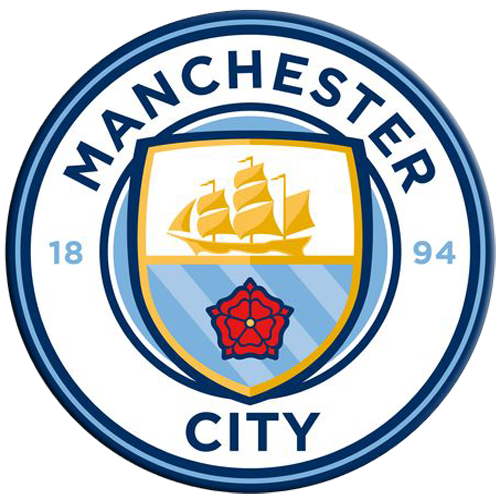
Details
- Name: Manchester City Football Club
- Nickname: City / The Citizens / The Sky Blues
- Founded: 1880 as St Marks (West Gorton)
- Renamed: 1894 to Manchester City
- Ground: Etihad Stadium
- Ground capacity: 41,000 – 2002 Commonwealth Games
- 55,097 – Domestic football
- 53,000 – UEFA-governed football
- 60,000 – Music concerts
The History:
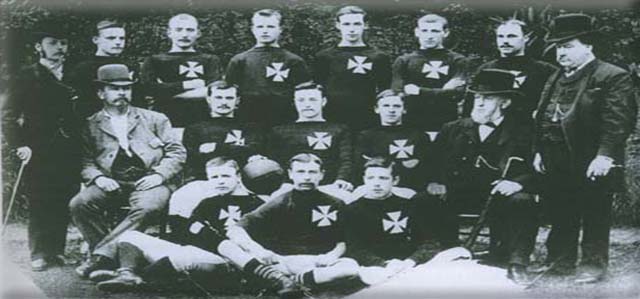
City gained their first honours by winning the Second Division in 1899; with it came promotion to the highest level in English football, the First Division. They went on to claim their first major honour on 23 April 1904, beating Bolton Wanderers 1–0 at Crystal Palace to win the FA Cup; City narrowly missed out on a League and Cup double that season after finishing runners-up in the League but City became the first club in Manchester to win a major honour.
In the seasons following the FA Cup triumph, the club was dogged by allegations of financial irregularities, culminating in the suspension of seventeen players in 1906, including captain Billy Meredith, who subsequently moved across town to Manchester United. A fire at Hyde Road destroyed the main stand in 1920, and in 1923 the club moved to their new purpose-built stadium at Maine Road in Moss Side.
In the 1930s, Manchester City reached two consecutive FA Cup finals, losing to Everton in 1933, before claiming the Cup by beating Portsmouth in 1934. During the 1934 cup run, Manchester City broke the record for the highest home attendance of any club in English football history, as 84,569 fans packed Maine Road for a sixth round FA Cup tie against Stoke City in 1934 – a record which still stands to this day.
The club won the First Division title for the first time in 1937, but were relegated the following season, despite scoring more goals than any other team in the division.Twenty years later, a City team inspired by a tactical system known as the Revie Plan reached consecutive FA Cup finals again, in 1955 and 1956; just as in the 1930s, they lost the first one, to Newcastle United, and won the second. The 1956 final, in which Manchester City beat Birmingham City 3–1, is one of the most famous finals of all-time, and is remembered for City goalkeeper Bert Trautmann continuing to play on after unknowingly breaking his neck.
After relegation to the Second Division in 1963, the future looked bleak with a record low home attendance of 8,015 against Swindon Town in January 1965. In the summer of 1965, the management team of Joe Mercer and Malcolm Allison was appointed. In the first season under Mercer, City won the Second Division title and made important signings in Mike Summerbee and Colin Bell. Two seasons later, in 1967–68, Manchester City claimed the League Championship for the second time, clinching the title on the final day of the season with a 4–3 win at Newcastle United and beating their close neighbours Manchester United into second place.
Further trophies followed: City won the FA Cup in 1969, before achieving European success by winning the European Cup Winners' Cup in 1970, beating Górnik Zabrze 2–1 in Vienna. City also won the League Cup that season, becoming the second English team to win a European trophy and a domestic trophy in the same season.
The club continued to challenge for honours throughout the 1970s, finishing one point behind the league champions on two occasions and reaching the final of the 1974 League Cup. One of the matches from this period that is most fondly remembered by supporters of Manchester City is the final match of the 1973–74 season against arch-rivals Manchester United, who needed to win to have any hope of avoiding relegation.
Former United player Denis Law scored with a backheel to give City a 1–0 win at Old Trafford and confirm the relegation of their rivals. The final trophy of the club's most successful period was won in 1976, when Newcastle United were beaten 2–1 in the League Cup final.
A long period of decline followed the success of the 1960s and 1970s. Malcolm Allison rejoined the club to become manager for the second time in 1979, but squandered large sums of money on unsuccessful signings, such as Steve Daley. A succession of managers then followed – seven in the 1980s alone. Under John Bond, City reached the 1981 FA Cup final but lost in a replay to Tottenham Hotspur. The club were twice relegated from the top flight in the 1980s (in 1983 and 1987), but returned to the top flight again in 1989 and finished fifth in 1991 and 1992 under the management of Peter Reid.
However, this was only a temporary respite, and following Reid's departure Manchester City's fortunes continued to fade. City were co-founders of the Premier League upon its creation in 1992, but after finishing ninth in its first season they endured three seasons of struggle before being relegated in 1996. After two seasons in Division One, City fell to the lowest point in their history, becoming the second ever European trophy winners to be relegated to their country's third league tier, after 1. FC Magdeburg of Germany.
After relegation, the club underwent off-the-field upheaval, with new chairman David Bernstein introducing greater fiscal discipline. Under manager Joe Royle, City were promoted at the first attempt, achieved in dramatic fashion in a play-off against Gillingham. A second successive promotion saw City return to the top division, but this proved to have been a step too far for the recovering club, and in 2001 City were relegated once more. Kevin Keegan replaced Royle as manager in the close season, and achieved an immediate return to the top division as the club won the 2001–02 Division One championship, breaking club records for the number of points gained and goals scored in a season in the process.
The 2002–03 season was the last at Maine Road, and included a 3–1 derby victory over rivals Manchester United, ending a run of 13 years without a derby win. City also qualified for European competition for the first time in 25 years. In the 2003 close season the club moved to the new City of Manchester Stadium. The first four seasons at the stadium all resulted in mid-table finishes. Former England manager Sven-Göran Eriksson became the club's first manager from overseas when appointed in 2007. After a bright start performances faded in the second half of the season, and Eriksson was sacked in June 2008. Eriksson was replaced by Mark Hughes two days later on 4 June 2008.
By 2008, the club was in a financially precarious position. Thaksin Shinawatra had taken control of the club a year before, but his political travails saw his assets frozen. Then, in August 2008, the club was purchased by the Abu Dhabi United Group. The takeover was immediately followed by a flurry of bids for high profile players; the club broke the British transfer record by signing Brazilian international Robinho from Real Madrid for £32.5 million. Performances were not a huge improvement on the previous season despite the influx of money however, with the team finishing tenth, although they did well to reach the quarter-finals of the UEFA Cup.
During the summer of 2009, the club took transfer spending to an unprecedented level, with an outlay of over £100 million on players Gareth Barry, Roque Santa Cruz, Kolo Touré, Emmanuel Adebayor, Carlos Tevez and Joleon Lescott. In December 2009, Mark Hughes – who had been hired shortly before the change in ownership but was originally retained by the new board – was replaced as manager by Roberto Mancini. City finished the season in fifth position in the Premier League, narrowly missing out on a place in the Champions League, and competed in the UEFA Europa League in season 2010–11.
Continued investment in players followed in successive seasons, and results began to match the upturn in player quality. City reached the 2011 FA Cup Final, their first major final in over thirty years, after defeating derby rivals Manchester United in the semi-final, the first time they had knocked their rival out of a cup competition since 1975. They defeated Stoke City 1–0 in the final, securing their fifth FA Cup, the club's first major trophy since winning the 1976 League Cup. In the same week, the club qualified for the UEFA Champions League for the first time since 1968 with a 1–0 Premier League win over Tottenham Hotspur.
On the last day of the 2010–11 season, City passed Arsenal for third place in the Premier League, thereby securing qualification directly into the Champions League group stage. Strong performances continued to follow in the 2011–12 season, with the club beginning the following season in commanding form, including beating Tottenham 5–1 at White Hart Lane and humbling Manchester United by a 6–1 scoreline in United's own stadium.
Although the strong form waned half-way through the season, and City at one point fell eight points behind their bitter rivals with only six games left to play, an unprecedented slump by the previous champions allowed the blue side of Manchester to draw back level with two games to go, setting up a thrilling finale to the season with both teams going into the last day equal on points.
Despite City only needing a home win against a team in the relegation zone, they still managed to fall a goal behind by the end of normal time, leading some of United's players to finish their game celebrating in the belief that they had won the league. Two goals in injury time – including one scored almost five minutes after normal time had elapsed – resulted in an almost-literal last-minute title victory, City's first in 44 years, and became only the fifth team to win the Premier League since its creation in 1992.
In the aftermath that followed, the event was described by media sources from the UK and around the world as the greatest moment in Premier League history. The game was only made all the more notable for former player Joey Barton's sending off, where he committed three separate red card-able incidents on three different players in the space of only a few seconds, resulting in a 12-game ban which effectively forced him to leave English football.
After an end to the season which many believed would only spur City on, however, the following season failed to capitalise on any of the gains made in the first two full seasons of Mancini's reign. The transfer window saw virtually no players join the club until the last day of the season, when a last-minute burst of activity saw four different players all join in the space of around 10 hours. The free-flowing football of the previous season was suddenly rare to behold, and while City rarely seemed likely to drop below second in the table, they posed little title challenge all season.
In the UEFA Champions League, the club was eliminated at the group stage for a second successive season, in a result which seemed to confirm Mancini's reputation as far better at managing in domestic games than European, while a second FA Cup final in three seasons ended in a 1–0 defeat to relegated Wigan Athletic, after rumours circulated that Mancini would be dismissed.
Mancini was dismissed two days later, ostensibly as he had failed to reach his targets for the season but with many in the press suggesting a break-down of relations between Mancini and his players but also between the Italian and his board-level superiors, while a refusal to promote young players was also cited. In his place was appointed the Chilean Manuel Pellegrini, who boasted a far more impressive Champions League record but less of a reputation for trophy-winning. In Pellegrini's first season, City won the League Cup and regained the Premier League title on the last day of the season. The following season, 2014-15, City finished Premier League Runners Up.
Pellegrini won the Capital One Cup in 2016 after beating Liverpool in the final, and left City with the 5th highest win percentage in Premier League history.
On 1 February 2016, Manchester City confirmed Pellegrini was leaving in June 2016 following expiry of contract with Pep Guardiola taking over from the 2016-17 season.
Guardiola won the 2017-18 Premier Leagur title amassing 100 points, breaking all previous records. In the same season, City also beat Arsenal 3-0 to win the EFL 'Carabao' Cup.
In 2018-19 Manchester City won the domestic treble, narrowly pipping Liverpool to the Premier League title, beating Watford 6-0 in the FA Cup final, and overcoming Chelsea 4-3 on penalties in the Carabao sponsored League Cup.
On 14th February 2020, City were banned from European competition for 2 years after being found to have committed "serious breaches" of Uefa's club licensing and financial fair play regulations, only to have the ban lifted after appeal on 13th July 2020. They beat Aston Villa 2-1 to win the Carabao Cup for the 3rd season running, and finished as Runner Up in the 2019-20 Premier League.
After the 2020-21 season, Manchester City won their 7th league title, after finishing top of the Premier League. The following season, they won it once again, on the final day of the 2021-22 campaign. The 2022–23 season turned out to be the greatest in the club's history, as Manchester City won their third consecutive Premier League title, the FA Cup final against rivals Manchester United, and their maiden Champions League title at the Atatürk Olympic Stadium in Istanbul against Inter Milan, thereby assembling a rare feat – the continental treble. The road to the Champions League victory included wins over European giants Bayern Munich, who were defeated 4–1 on aggregate, and Real Madrid, who suffered a 1–5 aggregate loss at the hands of City.
Manchester City's era of sustained competitive excellence coincided with charges of breaching Financial Fair Play (FFP) regulations. In 2020, the Court of Arbitration for Sport (CAS) ruled that sanctions placed on the club by UEFA were not justified, overturning City's two-year European ban. In 2023, the Premier League announced its own investigation of the allegations levied against Manchester City, charging the club with 115 breaches of its FFP rules up to the 2017–18 season.
In 2023-24 Manchester City claimed a record fourth Premier League title in a row on a dramatic final day of the 2023/24 season.
Pep Guardiola
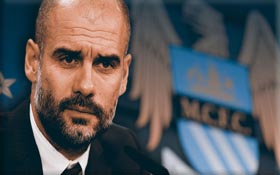
The Facts
Manchester City Football Club is a Premier League football club in Manchester, England. Founded in 1880 as St. Mark's (West Gorton), they became Ardwick Association Football Club in 1887 and Manchester City in 1894.
The club has played at the City of Manchester Stadium since 2003, having played at Maine Road from 1923.
The club's most successful period was in the late 1960s and early 1970s when they won the League Championship, FA Cup, League Cup and European Cup Winners' Cup under the management team of Joe Mercer and Malcolm Allison.
After losing the 1981 FA Cup Final, the club went through a period of decline, culminating in relegation to the third tier of English football for the only time in their history in 1998. Having regained Premier League status, the club was purchased in 2008 by Abu Dhabi United Group and has become one of the wealthiest in the world.
In 2011, Manchester City qualified for the UEFA Champions League and won the FA Cup. The following year, they won the Premier League, their first league title for 44 years. In 2014, they won the League Cup and a second Premier League title, before winning the League Cup again in 2016. More trophies were to follow ...
For further information check out their Official website or their Fan Forum
Sponsors
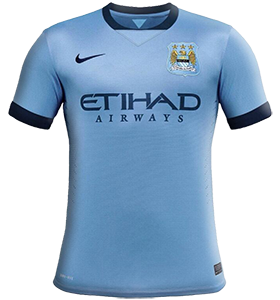
Notable Players
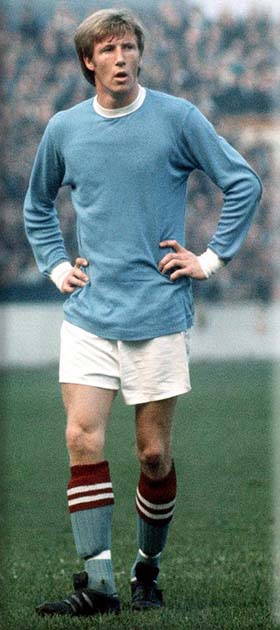
Colin Bell - 1966 to 1979
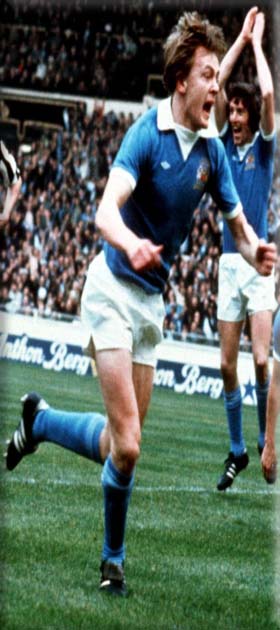
Peter Barnes - 1974 to 1979 & 1986 to 1987
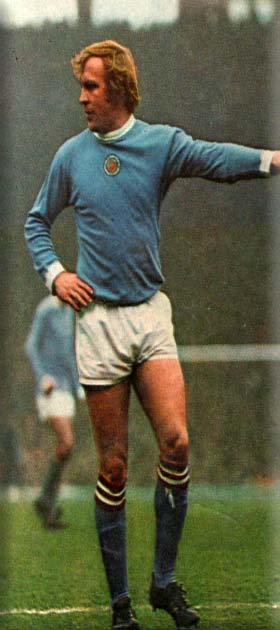
Francis Lee - 1967 to 1974
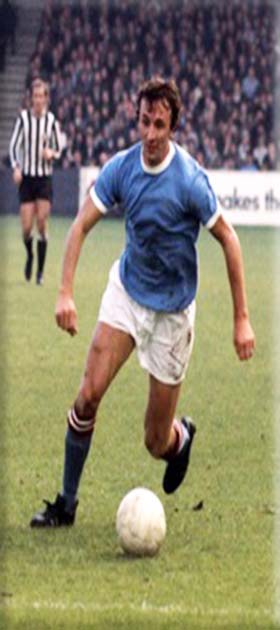
Mike Summerbee - 1965 to 1975
Maine Road:
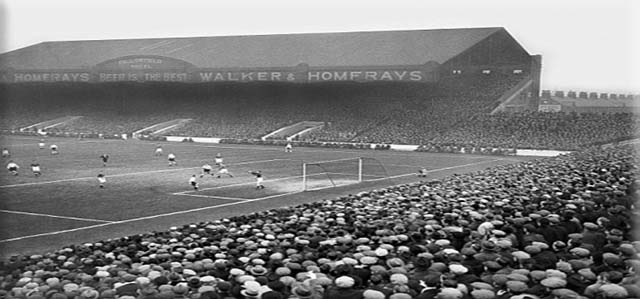
Tenants: Manchester City (1923 - 2003) Manchester United (1945 - 1949) Capacity: 35,150 - Opened: 1923 - Closed: 2003
Maine Road was a football stadium in Moss Side, Manchester, England that was home to Manchester City F.C. from its construction in 1923 until 2003. It hosted FA Cup semi-finals, Charity Shield matches, a League Cup final and England matches and, because of its high capacity, gained the nickname Wembley of the North.
Upon demolition, Maine Road had an obvious haphazard design with stands of varying heights due to the ground being renovated several times over its 80-year history. Maine Road was an all-seater stadium, with a capacity of 35,150. The 2002–03 season was Manchester City's last at Maine Road, with the last match played on 11 May 2003. The following season Manchester City moved to the City of Manchester Stadium in east Manchester, situated a mile from the city centre and near Ardwick where the club was originally formed in 1880.
Decision to move
Plans to build Maine Road were first announced in May 1922, following a decision by Manchester City F.C. to leave their Hyde Road ground, which did not have room for expansion and its main stand had been severely damaged by fire in 1920.
Two sites in Belle Vue, East Manchester were suggested, but neither was deemed sufficient. To many City fans east Manchester was regarded as City's home and a move to Belle Vue seemed right. But the site was just 8 acres (32,000 m2) and an available lease of 50 years was deemed too short by the club, so it was decided that City would move to Moss Side. The move to a larger stadium at Maine Road was backed by then manager Ernest Mangnall.
Many were disappointed when a site in south Manchester was chosen. A City director, John Ayrton, resigned from the Board later in the decade and helped to form a breakaway club, Manchester Central F.C. which played at Belle Vue.
Construction
A sixteen and a quarter acre former brickworks on Maine Road was purchased for £5,500. Maine Road was originally known as Dog Kennel Lane but renamed Maine Road (after the Maine law) during the 1870s at the insistence of the Temperance Movement who owned land on Dog Kennel Lane and the local authority accepted their request.
During construction, the stadium was reputedly cursed by a gypsy when officials evicted a gypsy camp from the area. This curse was allegedly removed on 28 December 1998. However, the gypsy curse is likely to be an urban myth, as such stories are endemic to a number of football league grounds. Construction took 300 days, the total cost £100,000. The initial layout of the ground consisted of one covered stand with a seating capacity of 10,000, and uncovered terracing on the other three sides, with gentle curves connecting the corners.
Early years and record attendance
The first match at Maine Road took place on 25 August 1923 when 58,159 fans watched the home side beat Sheffield United 2–1. The first changes to the ground took place in 1931, when the corner between the Main Stand and the Platt Lane end at the south of the ground was rebuilt to incorporate a roof. This renovation was the first of many, as Maine Road's layout and capacity was varied throughout its lifespan.
In 1934, the second highest attendance at an English football game at a club ground was recorded at Maine Road. The first was the 1913 FA Cup Final, hosted by Crystal Palace with an crowd of 121,919. The Maine Road match was between Manchester City and Stoke City in front of 84,569 fans in the 6th round of the FA Cup on 3 March 1934. Queues formed four hours before the match, and one journalist stated that Maine Road was packed two hours before kick-off. A decision was taken to close the turnstiles with an attendance at approximately 85,000, 3000 short of what was thought to be the maximum capacity. Supporters witnessed a visiting Stoke team which included Stanley Matthews and City's team boasted players, Frank Swift, Fred Tilson, Sam Cowan and Matt Busby. The match was won 1–0 by Manchester City.
Changes at the Platt Lane end took place in 1935, extending the terracing and providing a roof for the full stand. This marked the peak capacity of the ground, estimated at around 88,000. Further changes were planned, but suspended when Manchester City were relegated from Division One in 1938, and abandoned when World War II broke out.
The stadium was shared by Manchester United after the Second World War as Manchester United's Old Trafford ground had been damaged during the Manchester Blitz. United paid City £5,000 per season, plus a share of gate receipts.The highest attendance for a league game at Maine Road occurred during this period, when 83,260 people watched Manchester United play Arsenal on 17 January 1948. This figure is a national record for a league game. Maine Road was also used by Manchester United, to host three of their four home games, in the 1956–57 European Cup.
1950s to 1980s
Floodlights were installed in 1953, and in 1957, prompted by the hosting of two FA Cup semi-finals in successive years, the side facing the Main Stand (which until that time was generally known as the Popular Side) was redeveloped and named The Kippax Stand after a nearby street. Over the course of the 1960s and 1970s, the Kippax became the part of the ground where the club's most vociferous fans congregated. In 1963, benches were installed at the Platt Lane end, meaning that Maine Road had more seats than any other English club ground of the time. The next major redevelopment came in the 1970s, with the construction of the North Stand, a cantilevered stand which remained in place until the closure of Maine Road. The 1980s saw ambitious plans for improvements: however, these plans were shelved due to financial pressures after the Main Stand roof had been replaced at a cost of £1 million.
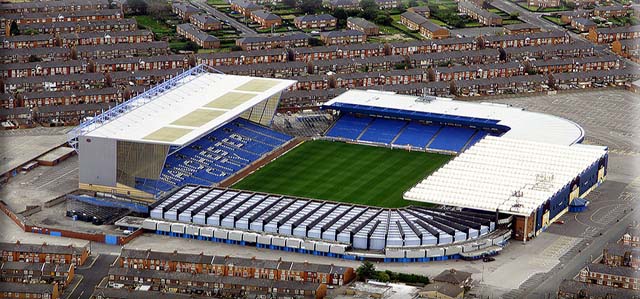
Regeneration
By 1990, some areas of the ground looked antiquated, and the Platt Lane stand was demolished in 1992. Its place was taken by the all-seater Umbro Stand that also incorporated executive boxes, and was opened in March 1993. The stand was renamed back to the Platt Lane Stand in the late 1990s.
The era of standing accommodation at Maine Road came to an end in May 1994 as the stadium became all-seater to comply with the requirements of the Taylor Report, with the demolition of the Kippax Street Terrace. The final match with standing permitted took place on 30 April 1994, against Chelsea for a 2–2 draw. Immediately prior to demolition the capacity of the Kippax terrace was 18,300. A three-tier stand was built in its place, holding nearly 14,000 spectators, and on its completion in October 1995 it was the tallest stand in the country, built at a cost of £16m in 1994, four times the turnover of the club according to then-chairman Francis Lee. The revamp of the Kippax was the second phase of a five-part development plan that would have cost £40m and increased the stadium's capacity to 45,024. However the club abandoned these plans as City continued their 1990s slide down the English football leagues.
The new stand was an impressive modern facility, but it also emphasised the haphazard nature in which the ground had been redeveloped, as all four sides were of differing heights and construction styles. There were further plans for expansion which would have taken the stadium's capacity to 45,000, but these were put on hold following City's relegation from the Premier League in 1996.
There were plans for further expansion at Maine Road to take the capacity to an all-seated 45,000, but these were abandoned in favour of a move to the City of Manchester Stadium built for the Commonwealth Games in 2002.
The final competitive match before the closure of the stadium took place on 11 May 2003 with a Premiership match against Southampton. Tickets were sold upwards of £250 and a crowd of 34,957, about 100 off maximum capacity filled Maine Road for the final day. City lost the match 1–0 with Michael Svensson scoring the stadium's last goal. The final match was followed by performances by musical acts Badly Drawn Boy and Doves.
City's final goal at the stadium was scored on 21 April 2003 by Marc-Vivien Foé during a 3–0 victory over Sunderland. Forty-five days later, the player died on 26 June from an undetected heart condition while representing the Cameroon national football team during the 2003 Confederations Cup.
An auction of the ground's fixtures and fittings took place in July 2003, raising £100,000, which was donated to community projects in the Moss Side area, which was undergoing a lengthy regeneration process. The two penalty spots and the centre spot were thought to be the most desired mementos, but all three had been cut out from the grass before the auction took place. The auction lasted for seven hours and 1,000 supporters attended the auction with interest from clubs such as Preston North End and Norwich City for the bigger lots which could be reused.
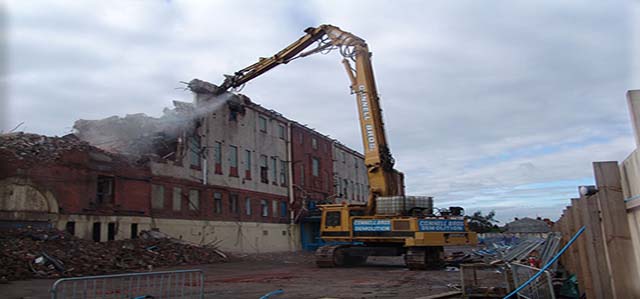
Redevelopment plans
Towards the end of Maine Road's lifespan there were proposals for other sports teams to make use of the stadium following City's relocation; Stockport County once expressed interest in moving there from Edgeley Park, and in December 2000 Sale Sharks rugby union club was offered a lease for the stadium. However, none of the proposals came to fruition and some past City players stated their dismay at the stadium not being renovated for mixed-use sport stadium. Demolition began in late 2003, lasting around ten months.
Two years later the go-ahead was given for a new housing development to take part on the site, consisting of 474 homes.
On the site now stands 474 new homes. There is a public art display commemorating the stadium and features a circular plate half open, symbolising the centre spot and the new emerging development which now sits on the Maine Road stadium.
Pitch
For long periods of its history Maine Road had the widest pitch in England. However, the width was changed several times by managers wishing to alter the pitch size to suit their style of play. In the final season before the ground was closed, the pitch size was 107 x 71 metres (116.5 x 78 yards). Maine Road's replacement, the City of Manchester Stadium has maintained this tradition of having a large pitch.




















